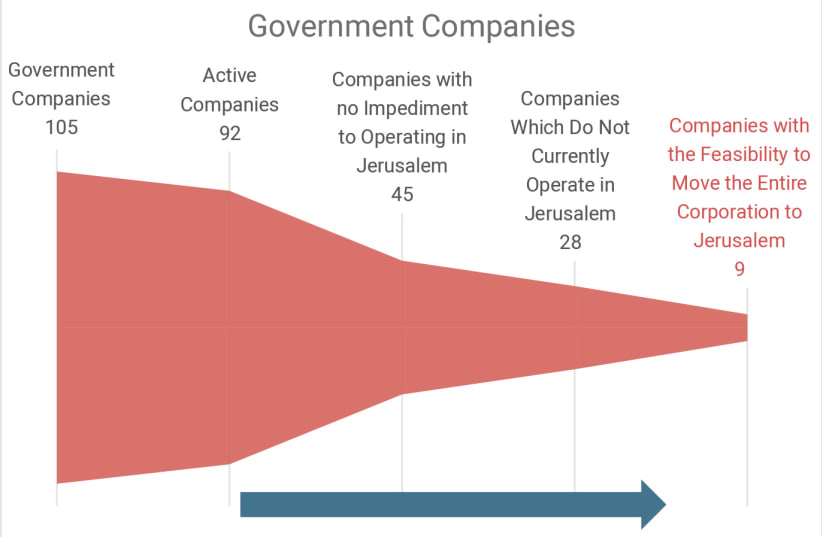There are 105 government companies in Israel, 70 of which are government-owned and promote public interests.
Among the 35 additional companies, 16 are government subsidiaries, 15 are mixed-ownership corporations and four are nonprofit organizations; 13 of the companies are inactive or in the process of liquidation.
In 2018, the average gross monthly salary at these companies was NIS 23,916 and they employed approximately 54,000 workers. Of the 70 government-owned companies, 17 are considered “major” corporations – their revenue constitutes about 97% of the total revenue of all the government companies, and they own approximately 97% of all the holdings.
The government companies are not legally obligated to operate from Jerusalem, unlike other entities, starting with government ministries, which are legally required to move to Jerusalem. Nonetheless, their relocation to the city embodies economic potential and the possibility of enhancing the city’s image. Government corporations are public employers that provide high-quality and stable employment and their relocation to Jerusalem would increase the supply of high-quality jobs offered in the city and contribute to strengthening the government network.
Racheli Hacohen and I, at the Jerusalem institute for policy research, examined the data:
• 17 government corporations are already located in Jerusalem: The Israel Government Tourist Corporation, The Israel Museum, the Postal Bank and also Israel Post Ltd. (a major company with 5,160 positions, which today is in the process of relocating from Jerusalem to Modi’in, along with its various subsidiaries)
• For 47 government companies, a move to Jerusalem would not be feasible, according to an analysis by the Knesset Research and Information Center (RIC), due to a lack of any commercial or geographic benefit to be derived from such a move. Examples of such companies are those which are responsible for physical locations, like The Museum of the Jewish People at Beit Hatfutsot, Ariel Sharon Park, and youth villages and institutions.
• It is feasible for 28 companies to move to Jerusalem, with a total relocation being feasible for 19 of them, while for the remaining nine it would be feasible to move their headquarters to the capital.
• Full relocation (a total of approximately 600 positions) is feasible for several companies, among them the Israel Ports Development & Assets Company Ltd. (according to a statement by its director), which is a major company with 134 positions; companies that manage funds for advanced study (kernot hishtalmut), such as those for educators; public companies such as The National Economic Council and The Geophysical Institute of Israel.
• Relocation of headquarters only is possible for nine major companies, including infrastructure companies like Petroleum & Energy Infrastructures Ltd., Israel Natural Gas Lines Ltd., Mekorot Water Company Ltd., Israel Electric Corporation and Amidar. Other companies that could move include subsidiaries of Mekorot Water Company Ltd. and Petroleum & Energy Infrastructures Ltd., as well as Trans Israel National Transportation Ventures. Together, these companies have a total of 14,642 positions, about 11,000 of them at the Israel Electric Corporation, although we lack data as to the size of its headquarters.
The data provided above was collected in the framework of the “Gov. City Project,” for the publication Indicators for a Gov. City, which will be published by the Institute in the coming months.
Translated by Gilah Kahn-Hoffmann.
